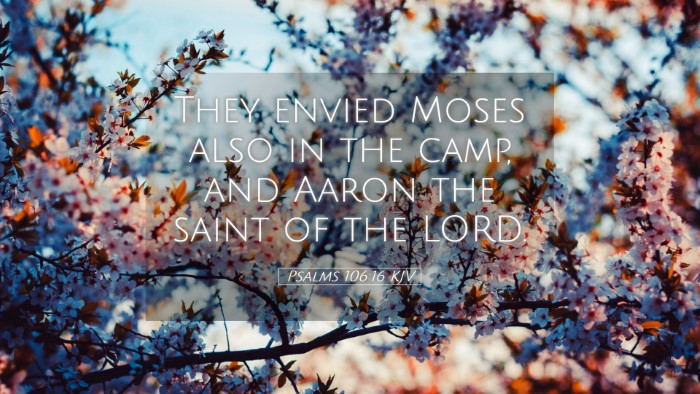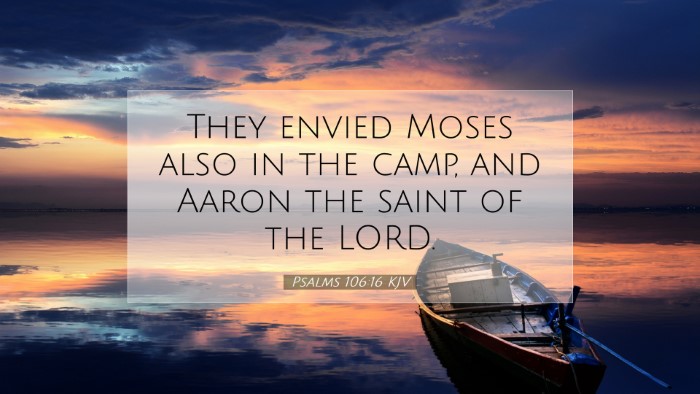Psalms 106:16 - Commentary Summary
Bible Verse: "They envied Moses also in the camp, and Aaron the saint of the LORD."
Introduction
The verse Psalms 106:16 reveals a critical moment in Israel's history during their wilderness journey. This commentary synthesizes insights from notable public domain theologians, providing a rich understanding applicable to pastors, students, and scholars.
Contextual Background
The context of Psalm 106 is a historical reflection on the unfaithfulness of Israel despite God's enduring mercy. The psalmist recounts Israel's repeated disobedience and the resulting consequences, emphasizing the perpetual struggle between divine patience and human rebellion.
Historical Context
The psalm recalls significant events from the Exodus, highlighting the tensions within the community, particularly those directed at their leaders, Moses and Aaron. The reference to envy indicates a deeper spiritual malaise among the people, revealing their dissatisfaction and lack of faith.
Commentary Insights
Matthew Henry's Thoughts
Matthew Henry emphasizes the nature of envy as a destructive force. He notes that the Israelites were not simply disgruntled but were driven by a spirit of dissatisfaction that manifested in envy towards their appointed leaders. Henry suggests that this envy stemmed from a desire for prominence and recognition, which clouded their judgment of Moses' and Aaron's divinely appointed roles.
- Leadership under Scrutiny: Henry points to the trials leaders face, particularly in the spiritual realm. The envy expressed by the people is a reminder of the burdens of leadership and the need for divine support.
- Divine Authority: The commentary reflects on the sanctity of divine appointment, noting how envy towards God's chosen leaders can lead to broader discontent with God's plans.
Albert Barnes' Analysis
Albert Barnes expands on the implications of this verse, highlighting that the envy towards Moses and Aaron was not merely personal but reflected a collective heart issue within the nation. According to Barnes, envy often arises when individuals or communities feel deprived or threatened by others' positions or blessings.
- Human Nature and Envy: Barnes draws a parallel to modern-day struggles, asserting that envy can poison relationships and impede spiritual growth. He encourages readers to examine the roots of their discontent and to seek a spirit of unity rather than division.
- Lessons on Leadership: His commentary encourages a focus on the responsibility of leaders to guide and protect rather than foster jealousy. The text serves as a warning about the need for leaders to remain humble and vigilant against the distractions of envy.
Adam Clarke's Commentary
Adam Clarke provides a more detailed examination of the emotional and spiritual landscape of the Israelite camp. He notes that the envy towards Moses and Aaron was exacerbated by the people's circumstances—namely, their wanderings and hardships in the desert.
- Spiritual Discontent: Clarke identifies envy as a symptom of deeper spiritual discontent and a lack of trust in God's provision. He articulates that the Israelites’ envy led to a desire for leadership that better suited their immediate desires, rather than recognizing God’s sovereign choice.
- The Role of Intercession: Moreover, Clarke highlights Aaron’s role as the intercessor. The mention of "Aaron the saint of the Lord" underscores the gravity of the people's rebellion against divinely appointed leadership and calls attention to the importance of pastoral intercession in the face of discontent from the congregation.
Theological Implications
This verse invites significant theological reflection on leadership, envy, and the human condition. It raises important questions about obedience to God’s appointed leaders and encourages a reassessment of our attitudes towards those in spiritual authority.
Understanding Envy in a Spiritual Context
Envy is recognized in Scripture as a sin that can blind individuals to God's ongoing work and provision in their lives. This verse serves as a caution against allowing dissatisfaction to fester into jealousy, which can lead to confrontation and division within a community of faith.
The Role of Leaders in Spiritual Communities
Moreover, this commentary suggests that leaders, like Moses and Aaron, carry the weight of their responsibilities in a manner that demands constant reliance on God's wisdom. The pressure of envy can lead to a spirit of fear or defensiveness in leadership that undermines effective ministry.
Practical Applications
- Self-Reflection: Pastors and church leaders are encouraged to examine their own hearts for areas of envy or dissatisfaction with God's plan. This reflection can foster humility and openness to God's leading.
- Congregational Unity: The congregation should be encouraged to foster unity and support for their leaders, recognizing their divine appointment and the challenges they face.
- Cultivating Contentment: Followers of Christ are be reminded of the importance of cultivating contentment and joy in their relationship with God rather than comparing themselves to others.
Conclusion
Psalms 106:16 serves as a powerful reminder of the destructive nature of envy and its capacity to undermine faith communities. The insights gathered from Matthew Henry, Albert Barnes, and Adam Clarke invite a deep reflection on leadership, community dynamics, and personal attitudes toward God’s sovereign choices. As the church moves forward, cultivating an environment of support, contentment, and trust in divine leadership will be critical for spiritual growth and unity.


